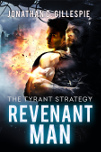The Tyrant Strategy and The Target Audience
April 24, 2012 in General Topics
Let’s talk target markets, by talking about The Tyrant Strategy. 
When I was conceptualizing this trilogy of fiction books (Part 1 coming this fall, kids!), I realized early on that I wanted to write for people who didn’t know they liked science fiction. I wanted an accessible military sci-fi epic with an emphasis on characters.
I wanted some extraordinary characters, but also ample heapings of regular folks that were meshed inextricably, and at times unwillingly, into the process of history being made — of the world changing. And these characters came from all walks of life. What’s crazy is how readily these characters overlap with my target audience.
Soldiers were a natural fit.
Soldiers see more history made than any other profession. You might argue that explorers or revolutionaries also create a lot of history, too, but I’d counter that many explorers were military men, and that revolutionaries almost always took up arms.
One of the most profound regrets in my life is that I never served. I have always counted myself lucky to know quite a few active-duty and veteran service members. My own father was a Navy Man. His father was a BAR gunner in WWII; he hit the beaches at Normandy. If I recall correctly, every Uncle I had served. On the other side of my family, I’ve got a relative who was a ball turret gunner in a B-17 bomber.
I can even take you all the way back to my ancestor, a Mr. Weaver, who surrendered when General Lee did. I have a copy of his surrender papers and a photo taken that day (Imagine Jed Clampett and you’ve a pretty good idea what he looked like).
I want, and will, direct a good chunk of my marketing to the military. This might be seen as obvious, because of the nature of the book, but it’s also in part because I just flat-out respect these people. Infantry feature heavily in the books. It’s my hope this will strike a chord with this reader base. But it happened organically. The presence of troops was an element key to the plot, not to the marketing.
There’s other people I want to draw in with my fiction, and though I can’t list them all, here’s some other key groups, and how they are reflected in the books:
Paging history nuts.
Astute and amateur historians alike are going to pick up a lot of parallels in the books — tactics, in particular — with strategies and events culled from both ancient, and modern history. 2142 is a very different time in the course of human events, but in the maelstrom of activity that surrounds my main characters, one will find that some fundamental tendencies of human nature haven’t changed.
One of the key characters in the book loves history. And he leans on it for methods in his own plotting.
Women are going to like the books. I really believe it.
I have a tiger of a female character — a mother that is backed into a corner and won’t roll over like those in control want her too. She’s tough, smart, determined, and she plays a major role in all three books. And she’s actually a former soldier herself.
Women have important roles in the books. They aren’t window dressing. They shouldn’t be!
While many women are avid fiction readers, I think there are still a great many who aren’t aware that they could like genre fiction. If there’s anything that Twilight (and now The Hunger Games) teaches us, it’s that there’s still women only beginning to engage in genre fiction.
So there’s tons of potential there.
Honk if you like positive Christian characters in fiction.
I do, and so there’s a compassionate Christian character in the book. In part, he’s present because I am distressed at the number of Christian stereotypes in mass-market media. His involvement in the tale also underscores one of the goals when I wrote these books: null profanity, emphasis on dialog quality.
(I expanded on that goal in another post.)
Having a Christian character also helps bring in Christian readers. And I want them engaged; I want more Christians involved in science fiction. I’d like to see more of them in the genre fiction community, because a balance of viewpoints is healthy, and right now I don’t think we have that.
Finally, youth play a major role.
Political events over the past few years reminded me that youth are a key component of political discourse, and are often a key element in social development and transformation. This is of course not a new phenomenon, as multiple revolutions and civil movements have provided evidence of.
In short, they’re young and restless, and necessary in the plot. They, too, are also a key group I’m chasing with this trilogy.
So there’s my wrapup of a few of my target audiences, and their own inclusion in the very essence of my trilogy. What blew me away about this process — I know folks won’t believe me — is I never wrote intending to have my work so chock full of people that represent my ideal reader base. But it happened, organically, and I’m pleased it did.
What about your own work?
Fiction Writers: Do you have a target audience for your work defined? Did you write them into your books? Why, or why not?
Stay tuned.

Recent Discussion